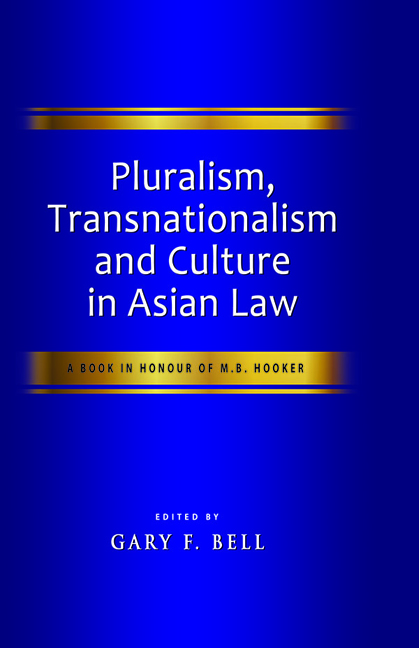Book contents
- Frontmatter
- Dedication
- Contents
- Preface
- Acknowledgements
- About the Contributors
- Chapter 1 M.B. Hooker and Southeast Asian Law: Path-breaking Passions
- Chapter 2 Asian Thought and Legal Diversity
- Chapter 3 Comparative Law, Anti-Essentialism and Intersectionality: Reflections from Southeast Asia in Search of an Elusive Balance
- Chapter 4 Legal Pluralism and Legal Anthropology: Experiences from Indonesia
- Chapter 5 Mapping the Relationship of Competing Legal Traditions in the Era of Transnationalism in Indonesia
- Chapter 6 Indonesia's Weak State Courts and Weak Law Fare Poorly in a Pluralist Commercial World
- Chapter 7 When Laws Are Not Enough: Ethics, Aesthetics, and Intra-Religious Pluralism in Contemporary Indonesia
- Chapter 8 Legal Pluralism and the Constitutional Position of East Malaysia's Indigenous Peoples: The View from the Longhouse
- Chapter 9 Sharia, State and Legal Pluralism in Indonesia: How Law Can You Go?
- Chapter 10 Negotiating Legal Pluralism in Court: Fatwa and the Crime of Blasphemy in Indonesia
- Chapter 11 Islamic Law in Israel: A Case Study in Legal Pluralism
- Chapter 12 The Road to Democracy Goes Through Religious Pluralism: The Indonesian Case and Thoughts on Post-Mubarak Egypt
Chapter 4 - Legal Pluralism and Legal Anthropology: Experiences from Indonesia
Published online by Cambridge University Press: 12 January 2018
- Frontmatter
- Dedication
- Contents
- Preface
- Acknowledgements
- About the Contributors
- Chapter 1 M.B. Hooker and Southeast Asian Law: Path-breaking Passions
- Chapter 2 Asian Thought and Legal Diversity
- Chapter 3 Comparative Law, Anti-Essentialism and Intersectionality: Reflections from Southeast Asia in Search of an Elusive Balance
- Chapter 4 Legal Pluralism and Legal Anthropology: Experiences from Indonesia
- Chapter 5 Mapping the Relationship of Competing Legal Traditions in the Era of Transnationalism in Indonesia
- Chapter 6 Indonesia's Weak State Courts and Weak Law Fare Poorly in a Pluralist Commercial World
- Chapter 7 When Laws Are Not Enough: Ethics, Aesthetics, and Intra-Religious Pluralism in Contemporary Indonesia
- Chapter 8 Legal Pluralism and the Constitutional Position of East Malaysia's Indigenous Peoples: The View from the Longhouse
- Chapter 9 Sharia, State and Legal Pluralism in Indonesia: How Law Can You Go?
- Chapter 10 Negotiating Legal Pluralism in Court: Fatwa and the Crime of Blasphemy in Indonesia
- Chapter 11 Islamic Law in Israel: A Case Study in Legal Pluralism
- Chapter 12 The Road to Democracy Goes Through Religious Pluralism: The Indonesian Case and Thoughts on Post-Mubarak Egypt
Summary
When Barry Hooker's masterful study titled Legal Pluralism: An Introduction to Colonial and Neo-colonial Laws was first published in 1975, it fortunately became an instant classic. As he introduced his core ideas on legal pluralism that to this day guide his work, Hooker addressed a range of topics that were remarkably broad and far-reaching, certainly for the time, but even by today's measure. At a time when legal pluralism primarily connoted colonial or post-colonial situations, Hooker's study demonstrated the relevance of this emergent field beyond the historical parameters of coloniality; in effect, to include such histories as the voluntary adoption of Western laws in countries such as Turkey, Thailand, and Ethiopia. Similarly, at a time when the field lacked a comprehensive assessment of studies undertaken at the intersection of law and anthropology, Hooker was among the first to offer a thorough review of the colonial and post-colonial anthropological writings on law, which essentially made up the first chapter, “Legal Pluralism and the Ethnography of Law”. Therein, he discusses the anthropological attempts to conceptualize law and the challenge of generating a comparative language devoid of ethnocentric assumptions, reiterating at the same time the importance of studying legal processes and court cases. The main failing of these anthropological studies of law and legal process, according to Hooker, was that they largely ignored the impact of colonial law (1975, p. 52). In confining themselves to a narrow study of a specific society (tribe, village) and its law, anthropologists rarely aspired to demonstrate the intimate link between the prevalent structures and the colonial legal administration. He notes in summary that “the important point for the student of plural laws is that both the legal ethnography of a particular society and the formal judicial machinery refer to one and the same people. The two fields of study, therefore, approach the same individuals from different standpoints” (1975, p. 53). At that time few anthropologists had proclaimed the importance of this overlooked connection, notably Bohannan (1965) and Moore (1970), who had shown a similar level of awareness as Hooker. No major critiques had yet emerged on the anthropologists’ propensity to “edit out” the state, its law, and its administrative institutions from the analysis of “their” society (Moore 1978; Chanock 1985).
- Type
- Chapter
- Information
- Pluralism, Transnationalism and Culture in Asian LawA Book in Honour of M.B. Hooker, pp. 70 - 89Publisher: ISEAS–Yusof Ishak InstitutePrint publication year: 2017



